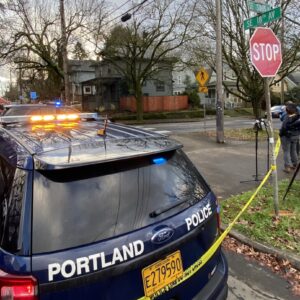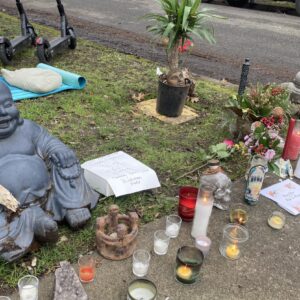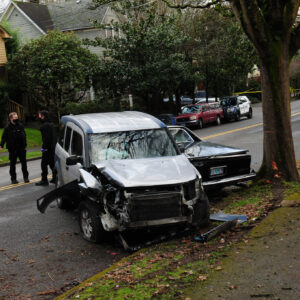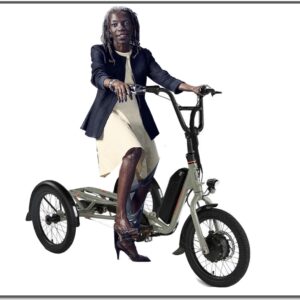
(Photos: Jonathan Maus/BikePortland)
Portland transportation leaders have responded to Monday’s vehicular violence. Below are statements from Portland Bureau of Transportation Commissioner Jo Ann Hardesty and PBOT Director Chris Warner.
Commissioner Hardesty:
“Yesterday Southeast Portland witnessed a terrible tragedy as a driver struck and killed a fellow Portlander while causing injuries to at least 5 others. I offer my deepest condolences to the family and friends who lost a loved one today. I’m holding them in my thoughts along with hope for the health of those injured. I want to thank the first responders from Portland Fire & Rescue, AMR, and PPB for their quick response in clearing the area and immediately beginning an investigation into what occurred. I’ve been waiting for more information before speaking on this incident and we now believe this to have been an intentional criminal act. I’ll continue to closely monitor this situation as more information becomes available.”
Advertisement
Director Warner:
“What happened yesterday in Southeast Portland was horrific. The death of one of our fellow Portlanders was a tragic loss. We wish those who were injured a speedy and full recovery. Early information suggests this was an intentional, criminal act. But it is nevertheless a reminder that people walking and biking are vulnerable, and of how important it is for us to look out for one another when driving.”
A vigil for victims is scheduled for today (Tuesday 1/26) at 5:00 pm. Mourners will gather at the field of Buckman Elementary School on Southeast Stark between 17th and 18th.
UPDATE: Portland Mayor Ted Wheeler just made a statement via Twitter:
“ Many in our city were affected by the hit-and-run incident in Southeast Portland yesterday that injured nine people and killed one person. I want to express my condolences to the loved ones of the victim who lost her life. I also want to wish the other victims a safe recovery.
Thank you to the many people who went above and beyond in responding to this incident: the witnesses who intervened to apprehend the subject; the firefighters, police officers and EMTs who responded on the scene; and the hospital workers who cared for the victims.
This was a disturbing incident that has affected how many people think about community safety.“
— Jonathan Maus: (503) 706-8804, @jonathan_maus on Twitter and jonathan@bikeportland.org
— Get our headlines delivered to your inbox.
— Support this independent community media outlet with a one-time contribution or monthly subscription.







Thanks for reading.
BikePortland has served this community with independent community journalism since 2005. We rely on subscriptions from readers like you to survive. Your financial support is vital in keeping this valuable resource alive and well.
Please subscribe today to strengthen and expand our work.
Weak statements. No sense of urgency. No display of how things may change. I only hope that these are just the first paragraphs of their statements.
What exactly can be done to prevent a homicidal maniac wanting to kill people, beyond a deep re-evalutation of our socio-economic arrangement and societal values (something our elected officials aren’t really in a position to do.)?
We could make it impossible for people to go 60 mph in our neighborhoods and divert car traffic to freeways and a small number of main arterials that avoid neighborhoods altogether (eg, at the perimeter of the city). The goal is to get more folks out of cars which requires a healthy, safe infrastructure consisting of bikeways, sidewalks and efficient public transit. When fewer people drive cars everyone benefits.
Do you think the suspect behaved perfectly on roads prior to this event? We can do a LOT. For instance, if we had installed a ubiquitous system of traffic cameras, this person would likely have a record, and perhaps even had his license suspended. We have implicitly condoned an inherently dangerous pattern of behavior that slowly trains people to act without expecting consequences, and sometimes with impunity.
He did have a record, according to the Oregonian. Maybe with ubiquitous surveillance he would have had a longer one. But at this point there is little reason to believe that poor driving was the cause of this incident, so it is quite possible that even with cameras watching over everyone, the driver’s license would not have been suspended prior to Monday.
and of course, whether cameras are the answer or not, if multiple camera citations cause a license to be revoked, without a system to provide a deterrent, certain types will just keep on drivin’
I appreciate Hardesty commenting on how tragic the 55 murders last year were or 100 or so homeless people who died on the streets she is in charge of… This was a terrible crime but one of a lot in this city she oversees…..
Yeah, thoughts and prayers. The government is a joke, and many Americans are brainwashed violent lunatics. Had enough yet?
I want to make a suggestion that we do not refer to people walking / biking / rolling as being “vulnerable.” It shifts attention to them, the victims, and away from cars and the people them. They are made vulnerable *because* of how dangerous cars are: if there were no cars, they would not be vulnerable. This focus on so-called vulnerable road users also puts a blind spot on people getting killed while driving a car [by someone driving a car].
Instead, we should emphasize that cars are inherently dangerous. Like this: “But it is nevertheless a reminder that cars are inherently dangerous. People driving them can easily put all of us in danger, whether we drive a vehicle, use a bike or wheelchair, or, sadly, just walk, stand or sit on a sidewalk.”
I’m not sure I agree; as a long time bike/ped planner for a statewide advocacy organization, the safety/vulnerability is one of the very few ways to get a wide swath of people to care about walking and biking. Rephrasing what leaders are saying isn’t going to do much.
I hear you. How about: “walking and biking are active, healthy ways to use our roads. Unfortunately, many people are reluctant to walk and bike on our roads because they do not feel safe due to a lack of protection against [dangerous] cars. We need to make our streets safer for everyone!”
I don’t own either a gun nor a car, nor have ever used either. I do however have several bikes and a nice collection of various kitchen knives. I regularly hear reports of suicide bombers in Iraq and Afghanistan using bicycles to get to their targets – should bicycles be banned? There was also the story a year or so ago about a person who randomly stabbed pedestrians in London with a kitchen cleaver, killing several and wounding many others before a pair of brave bystanders took him down. Should kitchen knives also be banned? Or should we ban pedestrians?
At what point do we realize that most gun users don’t kill other humans? Or that most car drivers don’t intentionally hit others, even if they contribute air pollution? Why do we aim to ban the devices but not the humans who possess them? And why do we believe that by banning a certain device, that a murderous human being won’t think of some other common legal tool for doing the dirty deed?
I haven’t talked about banning cars, and that’s really not what I have in mind. I just suggested changing the perspective, from one that focuses on victims to one that focuses on the tools that, and yes, the people who, put everyone using our roads in danger.
Another way to put it: we are all vulnerable road users. Our degree of vulnerability depends on how we use the roads, but also our age; our gender; our race and ethnicity; the place we are; etc. And we are *made* vulnerable because of our laws and infrastructure.
“And we are *made* vulnerable because of our laws and infrastructure.” And the people who deliberately and illegally choose to use those tools as deadly weapons, or use those tools wrong through deliberate negligence and/or impairment.
It takes human agency to make a tool deadly or dangerous – the tool itself is not inherently dangerous. Until we have murderous A.I., our cars don’t go out to kill people, their human users sometimes do. The cars themselves are not dangerous – most of the time they are dead chunks of metal sitting out in the street or in garages – but their drivers are something else, alive, and potentially dangerous.
I guess it depends how you define “inherently”. If you view a tool as “not inherently dangerous” if it’s safe when it’s used perfectly, then most tools are safe. Otherwise, many are not. Power tools aren’t dangerous if used perfectly, yet thousands of people are injured every year by them. I wouldn’t call a leaf blower dangerous but I would a table saw.
And of all tools, cars are among the most inherently dangerous, because they can injure or kill people in or around them if even one out or two out of hundreds of factors affecting their safety are less than perfect, even when the driver isn’t intending to hurt anyone.
This is the same argument that Second Amendment fanatics use to argue that it should be legal to buy a machine gun without a background check.
Hi David, thank you for your feedback. May I quote from my reply to your first comment above:
Emphasis is mine. See, we agree! 🙂
Yes, we do!
Amplifying Stephan’s comment that using “vulnerable” to describe people not driving a car that are on, or near, the road shifts the focus away from the problem, which is that cars are inherently dangerous for everyone, including their drivers and passengers.
PBOT Director Warner:
“But it is nevertheless a reminder that people walking and biking are vulnerable, and of how important it is for us to look out for one another when driving.”
Stephan’s suggestion:
“But it is nevertheless a reminder that cars are inherently dangerous. People driving them can easily put all of us in danger, whether we drive a vehicle, use a bike or wheelchair, or, sadly, just walk, stand or sit on a sidewalk.”
I should have said that I am repeating it, since my saying it does not really amplify it.
Thanks, Daniel, that’s exactly what I meant! I took the quote and changed it to highlight how different the message would be.”
There is no protection from crazy. Unless you want to lock them all in a confined space.
RIP
Yes there is. We just don’t have the mental healthcare system to take care of these folks. Perhaps more importantly, we don’t have the social safety nets that many other countries have. There are certainly mentally ill people in Holland, Denmark, Sweden, Canada, Japan, Iran…Yet we just don’t see the level of violence (vehicular and otherwise) coming out of those countries. Our government must provide the proper safety nets in the forms of healthcare, education, housing, etc so that folks don’t resort to violence.
Lastly, we don’t yet know if the driver has or has had mental health problems as the investigation is ongoing.
I just find it interesting that this grumpy, well crazy actually, late-middle aged guy from Oregon City comes up to the exact neighborhood which voted the most for Sara Iannarone (look it up!–Oregonian did a map) to do this.